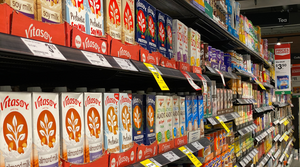Environmental and sustainability concerns of dairy-alternatives such as soy milk in coffee beverages?
Dairy-alternatives, such as soy milk, have gained popularity as a sustainable and ethical option for coffee beverages, particularly among those who avoid dairy for environmental, health, or ethical reasons. While soy milk has many advantages, there are also some environmental and sustainability concerns that need to be considered.
- Land use and deforestation: Soy is a major crop in many countries, including Brazil and the United States, where large areas of land are used for soybean cultivation. This can lead to deforestation, which has a significant impact on biodiversity and contributes to climate change. In addition, soy crops are often genetically modified, which raises concerns about the long-term ecological impact.
- Water use: Like many crops, soy requires a significant amount of water to grow. The amount of water used to produce soy milk is generally lower than the amount used for dairy milk, but it still has an impact on water resources, particularly in regions where water is scarce.
- Transportation and processing: The production and transportation of soy milk can also contribute to greenhouse gas emissions and other environmental impacts. The energy and resources required to process and package soy milk also need to be taken into account.
- Packaging waste: Some soy milk products come in plastic packaging, which contributes to plastic pollution and waste. While some brands use recyclable or biodegradable packaging, the plastic waste element remains a concern.
It is worth noting that these environmental and sustainability concerns also apply to other dairy-alternatives, such as almond, oat, and rice milk. However, there are also many benefits to choosing these plant-based alternatives, including a lower carbon footprint, reduced animal cruelty, and improved health outcomes for some people. Ultimately, the decision to use dairy-alternatives like soy milk in coffee beverages is a personal one that should take into account a range of factors, including taste, ethics, and environmental impact.

